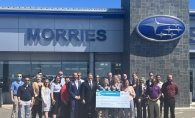Lake-area residents Ryan Foss and Erin Hammer rowed, rowed, rowed their boat, but it certainly wasn’t gently down the stream.
As Team Endurance Limits USA, the pair embarked in June, attempting to row more than 3,000 miles from Monterey, California to Waikiki, Hawaii in an effort to raise money for three children’s hospitals across the country. (While the actual distance from Monterey to Waikiki is about 2,400 miles, the team estimates that wind and tide challenges would have put their mileage above 3,000.)
We first talked with Foss, a Tonka Bay resident, and Hammer last spring, as they were training for the challenge. “This is going to be really tough and surely pretty grueling, but it’s nowhere close to what kids at these hospitals have to deal with every day,” Foss says. They planned to raise funds for three children’s hospitals: Children’s Minnesota, Children’s Hospital Colorado and Children’s Healthcare of Atlanta. “We selected these hospitals because they really set the bar for children’s health care in the United States,” Foss says.
The original Endurance Limits UK rowing team was founded by Darren Clawson after his son, Hadley, received life-saving treatment for chronic seizures. Originally, Endurance Limits benefited Great Ormond Street Hospital in London, where Hadley received the bulk of his treatment. Foss and Hammer became friends with Clawson when they were competing in a long-distance race in 2014. “We’ve always been really into these types of competitions, especially when we can raise money for something that really matters,” Hammer says.
The duo decided in 2015 to embark on their new trek, with daily training and thousands of hours of planning and preparation. But this time, the challenge was on the water. On their vessel, named Mugatu, the pair packed freeze-dried food, a water desalinator, light emergency medical equipment and solar panels to power their electronics, plus a satellite phone. What about a motor? “No motor aboard whatsoever,” Foss says. “Just the two of us rowing the whole way there.”
The Great Pacific Race rowing event began on June 4, with Foss and Hammer targeting a July 18 arrival in Waikiki. That would have been 44 days of an unpredictable climate, harsh wind patterns and difficult rowing conditions, not to mention the physical toll and mental hurdles along the way.
But Mother Nature had other plans. On June 11, just a week into their journey, the team met the volatility of the ocean face to face. After a windy night, Foss and Hammer were preparing for the day ahead. “We were both out on deck,” says Hammer. “Out of the corner of my eye, I saw a monster wave coming, and it tipped us.” The boat righted itself, and Hammer and Foss began gathering up their gear. At first, things seemed okay. “We figured we’d capsize at some point,” says Hammer. But as the day went on, she noticed pain and swelling in her wrist, which had been injured at some point during the capsize. When things didn’t improve, “we decided it was time to call the race directors,” she says. The pair spent two more days on the boat, and were evacuated by helicopter on June 13 so Hammer could be treated at a hospital in Santa Barbara, where she found out her wrist was broken.
“It’s so heartbreaking not to have finished the race,” says Hammer, “because we had so much support. We’re so grateful to all of our sponsors. People were so generous and kind.” The Mugatu was anchored about 200 miles offshore, so Hammer and Foss found a fisherman who could transport the boat back to California. From there, it was towed home to Minnesota, where, as of this writing, it awaits sale. “We’re planning to sell the boat, and the funds will go to the three hospitals we were supporting during the race,” Hammer says.
“I would love to attempt the race again,” says Foss, “but it really needs to be the perfect storm of time off from work, funding and family buy-in.” For now, Foss and Hammer are focusing on getting back to life on dry land.









